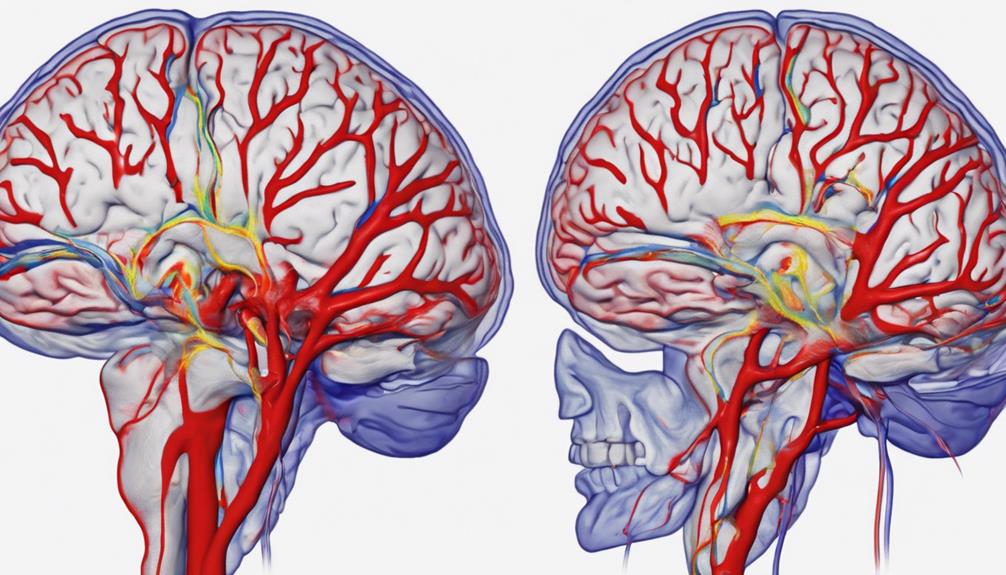The combination of narcissism and dementia presents complex obstacles in the field of cognitive deterioration.
As we explore the intricate dance between these two conditions, one must ponder the profound implications of how narcissistic traits manifest in the face of memory loss.
The journey through this complex terrain unveils layers of emotions and behaviors that demand careful navigation and understanding, shedding light on the intricacies of the human mind as it grapples with its own image.
Key Takeaways
- Vulnerable narcissism increases Alzheimer's risk.
- Caregivers face resistance and emotional exhaustion.
- Tailored caregiving crucial for narcissistic individuals with dementia.
- Setting boundaries and seeking professional guidance aids coping strategies.
Understanding Narcissistic Traits in Dementia
Understanding the manifestation of narcissistic traits in individuals with dementia provides crucial insights into the complex relationship between personality characteristics and neurodegenerative diseases. Pathological narcissism, especially vulnerability traits like hiding the self and devaluing the self, has been linked to a higher risk of developing Alzheimer's disease in older adults. Studies indicate that older age and lower education levels independently contribute to the risk of Alzheimer's disease in individuals exhibiting pathological narcissistic traits. Moreover, pathological narcissistic vulnerability traits may serve as a significant risk factor for the progression of dementia, emphasizing the intricate interplay between personality traits and cognitive decline.
It is essential to recognize that different aspects of narcissistic personality traits can impact the risk of Alzheimer's disease differently. This underscores the necessity of considering comorbid conditions when understanding the pathway to dementia in individuals with narcissistic traits. The association between pathological narcissism and the risk of Alzheimer's disease highlights the importance of implementing preventive strategies and adopting a multifactorial approach to address cognitive decline effectively in this population.
Challenges of Managing Narcissism and Dementia

The intersection of narcissism and dementia presents unique challenges in caregiving due to the complex dynamics arising from the narcissist's resistance to assistance and the progressive cognitive decline associated with dementia. Caregivers of individuals with narcissistic traits and dementia may encounter increased manipulation, aggression, and denial of symptoms as the disease advances. The narcissistic behaviors such as blaming others, extreme disengagement, and heightened irritability can become more pronounced and challenging for caregivers to manage in the presence of dementia symptoms.
The progression of dementia in individuals with narcissistic tendencies can lead to severe cognitive decline, resulting in increased isolation and difficulty recognizing the necessity for full-time care. Caregivers may observe a shift in the narcissist's personality as dementia progresses, revealing vulnerabilities, emotional needs, and occasional non-narcissistic behaviors. These challenges highlight the importance of tailored caregiving approaches that address both the cognitive decline associated with dementia and the unique emotional needs of individuals with narcissistic traits.
Impact on Caregivers and Relationships
Amidst the challenges of caring for individuals with narcissistic traits and dementia, caregivers often find themselves grappling with emotional exhaustion and heightened stress levels. The impact on caregivers and relationships when dealing with narcissistic personality disorder in dementia patients can be profound. Here are three key points to consider:
- Strained Relationships: Caregivers may experience strained relationships with the individual suffering from narcissistic personality disorder and dementia, leading to feelings of frustration and worthlessness.
- Emotional Exhaustion: The demanding behaviors of individuals with narcissistic traits and dementia can result in emotional exhaustion for caregivers, affecting their mental health and overall well-being.
- Neglect of Personal Needs: Caregivers often neglect their own personal needs when prioritizing the care of someone with narcissistic traits and dementia, underscoring the importance of self-care and seeking support from others.
In navigating the complexities of caregiving for individuals with narcissistic traits and dementia, it's crucial for caregivers to implement coping mechanisms, prioritize mental health, and engage in activities that promote their well-being and resilience.
Strategies for Coping With Dual Diagnosis

Navigating the complexities of caregiving for individuals with both narcissistic personality disorder and dementia requires caregivers to implement tailored strategies to effectively manage their care. Setting clear boundaries is essential to protect oneself from the potential risks associated with providing care in such situations. Seeking professional guidance can offer valuable insights into managing the cognitive challenges presented by frontotemporal dementia alongside narcissistic behaviors. Prioritizing self-care is crucial to maintaining well-being while caring for individuals with this dual diagnosis. Understanding the unique interplay between narcissistic traits and dementia symptoms is key to developing personalized care approaches that address the specific needs of the individual. By educating themselves about both conditions and their implications, caregivers can feel more equipped to provide compassionate and effective care. Below is a table highlighting key strategies for coping with the dual diagnosis of narcissistic personality disorder and dementia:
| Strategy | Description |
|---|---|
| Set Boundaries | Establish clear limits to protect one's emotional and mental well-being |
| Seek Professional Support | Consult with experts to navigate the cognitive challenges effectively |
| Prioritize Self-Care | Focus on mental health maintenance and healthy coping mechanisms |
| Understand the Interplay | Recognize how narcissistic behaviors and dementia symptoms interact |
| Educate Yourself | Learn about both conditions to provide compassionate and tailored care |
Seeking Support and Resources
When seeking support and resources for caregivers of individuals with narcissistic personality disorder and dementia, exploring therapy options, support groups, and online resources can provide valuable guidance and emotional assistance. Here are three essential avenues for caregivers to consider:
- Therapy Options: Seeking therapy from mental health professionals experienced in dealing with narcissism and dementia can offer caregivers a safe space to express their emotions, learn coping strategies, and gain valuable insights into managing the complexities of caregiving.
- Support Groups: Joining support groups specifically tailored to caregivers of individuals with narcissistic personality disorder and dementia can provide a sense of community, reassurance, and shared experiences. These groups offer a platform for caregivers to connect, exchange advice, and access emotional support.
- Online Resources: Utilizing online resources such as educational websites, forums, and hotlines can offer caregivers quick access to information, tips, and immediate assistance when faced with challenging situations. These resources can enhance caregivers' understanding of narcissism and dementia, providing practical guidance for effective caregiving.
Frequently Asked Questions
Is There a Link Between Narcissism and Dementia?
Yes, there's a link between narcissism and dementia. Current research suggests that pathological narcissistic traits, when present in older adults, can increase the risk of developing Alzheimer's disease.
Factors like age and education level also play a role in the risk of Alzheimer's. Moreover, high scores in narcissistic vulnerability traits may significantly elevate the risk of dementia progression.
Understanding how different aspects of narcissistic traits influence Alzheimer's risk is crucial in addressing this connection.
What Is the Root of Narcissism?
We believe that the root of narcissism often originates from early childhood experiences and upbringing. Traits may develop due to a lack of emotional validation and excessive praise during formative years.
Genetic factors and neurobiological differences could also contribute to the formation of narcissistic personality traits. Insecure attachment styles and childhood trauma may play a role in the development of narcissistic behaviors.
Research indicates a combination of genetic predisposition and environmental factors influence the root of narcissism.
What Does Narcissism Look Like in the Elderly?
Narcissism in the elderly can present as a persistent need for admiration and a grandiose self-image. This behavior may be accompanied by increased irritability and resistance to medical care.
As individuals age, their narcissistic traits can become more pronounced, impacting their relationships and interactions. Understanding these manifestations is crucial in providing appropriate care and support for elderly individuals exhibiting narcissistic tendencies.
What Is the One Question to Identify a Narcissist?
When assessing for narcissistic traits, a pivotal question to consider is how individuals handle criticism. This inquiry can provide valuable insights into their self-esteem, emotional regulation, and interpersonal dynamics.
Observing reactions to feedback reveals key indicators of potential narcissism, such as defensiveness or aggression. Understanding these responses enables a more comprehensive evaluation of an individual's behavior and psychological makeup. It's a critical aspect of recognizing and addressing narcissistic tendencies.
Conclusion
In conclusion, navigating the complexities of narcissism and dementia requires patience, understanding, and resilience.
How can we support individuals facing this dual diagnosis while also caring for ourselves?
It's a challenging journey, but with the right strategies and support, we can find ways to cope and navigate this unique intersection of mental health and cognitive decline.









